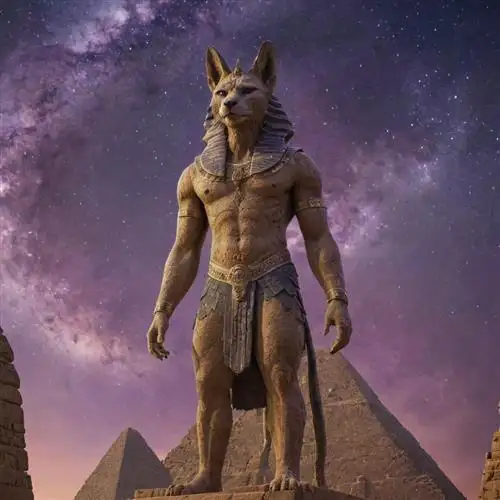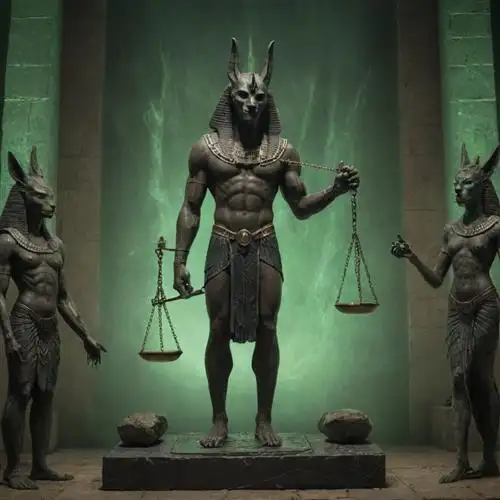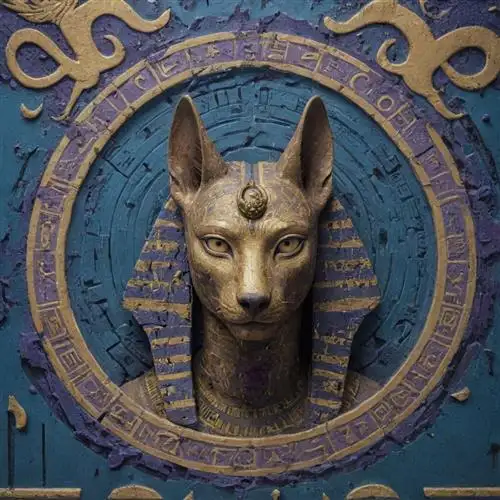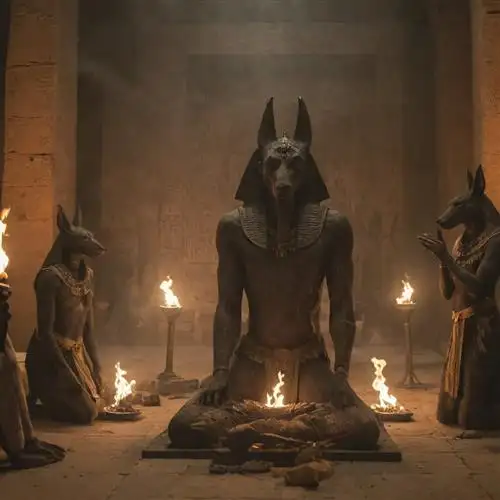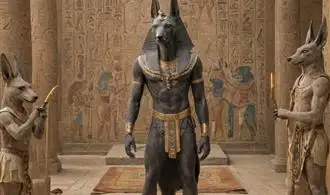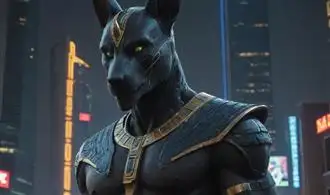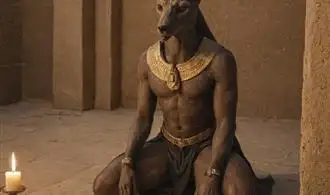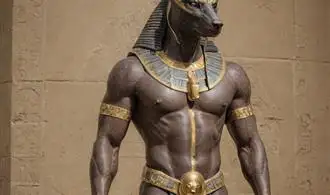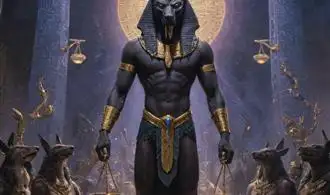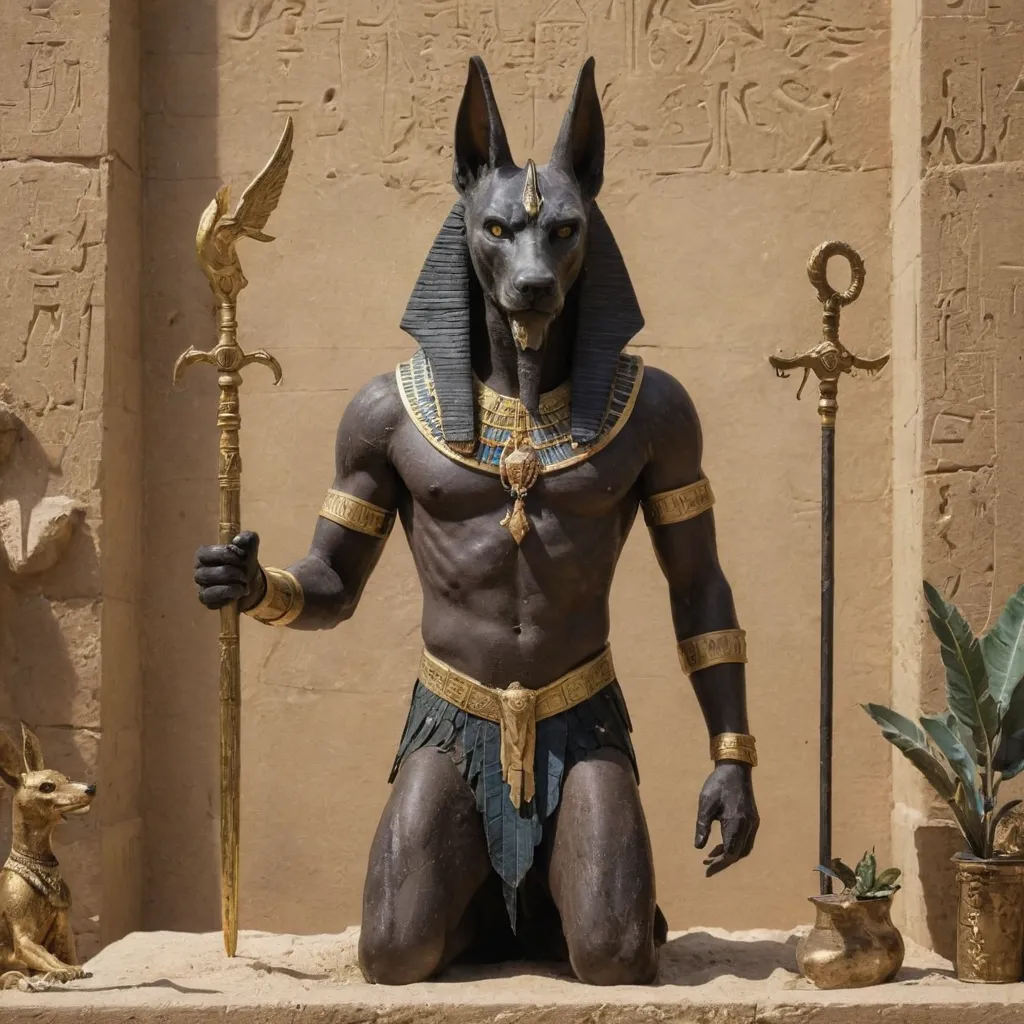
The Origins of Anubis the Jackal God
Anubis, the enigmatic jackal-headed deity, has captured the imagination of scholars and enthusiasts alike for centuries. This ancient Egyptian god's origins can be traced back to the earliest dynasties, where he played a crucial role in the rituals and beliefs of the ancient Nile civilization. Anubis's evolution from a regional deity to a prominent figure in the Egyptian pantheon is a testament to the enduring power of this mythological icon.
One of the earliest known depictions of Anubis dates back to the First Dynasty, around 3100 BCE. In these early representations, Anubis was associated with the necropolis and the mummification process, reflecting his role as the guardian of the dead. His canine or jackal-like features were likely derived from the observation of these scavenging animals, which were known to prowl around ancient Egyptian cemeteries and tombs.
As the ancient Egyptian civilisation progressed, the worship and veneration of Anubis evolved. By the Third Dynasty, around 2700 BCE, Anubis had become a central figure in the funerary rituals and the journey of the deceased into the afterlife. He was believed to guide the souls of the dead, weigh their hearts against the feather of truth, and protect the mummified body during the embalming process.
The association between Anubis and the mummification process is particularly significant. Anubis was thought to have invented the art of embalming, and his role as the protector of the dead was crucial in ensuring the successful transition of the deceased into the afterworld. This connection with the mummification rites solidified Anubis's status as a vital deity in the ancient Egyptian belief system.
Interestingly, the origins of Anubis's jackal-like appearance have been the subject of much debate among scholars. Some believe that the jackal was chosen as Anubis's animal form due to the scavenger's association with cemeteries and the decomposition of the dead. Others suggest that the jackal-headed deity may have been inspired by the African wild dog or the golden jackal, both of which were native to the region and played a role in the ancient Egyptian ecosystem.
The Roles and Responsibilities of Anubis
Anubis, the ancient Egyptian deity associated with mummification and the afterlife, held a crucial role in the sacred rituals and beliefs of the ancient Egyptians. As the god who guided the dead through the process of mummification and the journey to the afterlife, Anubis' responsibilities were multifaceted and integral to the Egyptian conception of the afterlife.
One of Anubis' primary roles was as the overseer of the mummification process. He was believed to have taught the art of embalming to the ancient Egyptians, ensuring the proper preservation of the deceased body. Anubis would stand guard over the mummy, protecting it from harm and guiding the soul through the dangerous passages of the afterlife. The ancient Egyptians would often depict Anubis as a jackal-headed figure, symbolizing his association with the embalming process and the transition between life and death.
Additionally, Anubis was responsible for weighing the heart of the deceased against the feather of Ma'at, the goddess of truth and justice, during the judgement of the dead. This ritual, known as the "Weighing of the Heart," determined whether the individual's soul was worthy of entering the afterlife. Anubis would then lead the worthy soul to Osiris, the lord of the underworld, for final judgment and passage into the realm of the dead.
Anubis was also believed to be the patron of cemeteries and necropolises, the sacred burial grounds of the ancient Egyptians. He was tasked with guarding these sacred spaces and ensuring the proper burial and afterlife of the deceased. The ancient Egyptians would often place statues of Anubis at the entrance of tombs and temples, symbolizing his role as the protector of the dead.
Furthermore, Anubis was associated with the preparation and mummification of the deceased. He was believed to have overseen the process of embalming, ensuring the proper preservation of the body and the soul's safe passage to the afterlife. The ancient Egyptians would often invoke Anubis' name during the mummification rituals, asking for his guidance and protection.
Anubis Symbolism and Iconography
Anubis, the ancient Egyptian deity associated with the afterlife, is renowned for its distinct symbolism and iconic representation. As one of the most prominent figures in Egyptian mythology, Anubis holds a significant place in the cultural and religious landscape of the ancient civilization.
The jackal-headed figure of Anubis is a testament to its profound connection with the processes of death and mummification. The jackal, or dog-like creature, was believed to be the ideal representation of Anubis, as these animals were often found prowling around cemeteries and burial sites, guarding the dead and assisting in the embalming process.
The black color of Anubis' skin is another crucial aspect of its symbolism. Black was associated with the fertile soil of the Nile River, as well as the color of decomposition and the underworld. This color choice, therefore, reinforced Anubis' role as the guardian of the dead and the overseer of the mummification process.
Anubis' iconography often depicts the deity holding the crook and flail, symbols of kingship and authority. These items were traditionally associated with the pharaohs, indicating Anubis' importance and power within the Egyptian pantheon. The deity is also frequently shown standing or sitting, sometimes with a scale or a canopic jar, further emphasizing its roles in the afterlife and the judgment of the dead.
Another significant aspect of Anubis' iconography is its association with the burial rituals and the embalming process. Anubis was believed to be the patron deity of embalmers and was invoked during the mummification of the deceased. The deity's presence was thought to ensure a successful transition to the afterlife and the preservation of the body.
Furthermore, Anubis was often depicted alongside other important deities, such as Osiris, the god of the underworld, and Isis, the goddess of magic and healing. These associations further highlight Anubis' central role in the complex web of Egyptian religious beliefs and practices.
The Cult of Anubis and Its Practices
The cult of Anubis, the ancient Egyptian god of the dead, was a complex and multifaceted religious tradition that held immense significance in the lives of the ancient Egyptians. At the heart of this cult were a series of practices and rituals that were designed to honor the god and ensure the safe passage of the deceased into the afterlife.
One of the most important aspects of the Anubis cult was the role of the god as the protector of the dead. Anubis was responsible for overseeing the mummification process, ensuring that the body of the deceased was properly prepared for the journey to the afterlife. This involved a series of intricate rituals, including the removal of the internal organs, the application of various preservatives, and the wrapping of the body in linen bandages.
In addition to the mummification process, the Anubis cult also placed a strong emphasis on the importance of the funeral rites and the preparation of the tomb. The deceased were often buried with a variety of offerings, including food, clothing, and personal possessions, to ensure that they had everything they needed in the afterlife. The tomb itself was often elaborately decorated with images and hieroglyphics that were intended to guide the deceased on their journey through the underworld.
Another key aspect of the Anubis cult was the role of the god as the judge of the dead. According to Egyptian mythology, Anubis was responsible for weighing the heart of the deceased against the feather of truth, to determine whether the individual was worthy of entering the afterlife. This ritual, known as the "Weighing of the Heart," was a critical component of the funerary rites and was believed to have a profound impact on the fate of the deceased in the afterlife.
The Anubis cult also played a significant role in the annual festivals and celebrations that were held in honor of the god. These events often involved elaborate processions, rituals, and offerings, and were attended by large crowds of worshippers. The most important of these festivals was the Feast of Sokar, which was held annually in the necropolis of Saqqara and was dedicated to the god Anubis and the deceased pharaohs.
Anubis in Mythology and Afterlife Beliefs
Anubis, the jackal-headed deity, has long been a figure of fascination in Egyptian mythology and afterlife beliefs. This enigmatic god played a pivotal role in the journey of the deceased, guiding them through the complex and often treacherous landscape of the underworld. Understanding the true nature and significance of Anubis is crucial for those seeking to delve deeper into the rich tapestry of ancient Egyptian spirituality.
In Egyptian mythology, Anubis was responsible for the embalming and mummification process, ensuring the proper preparation of the deceased for their journey to the afterlife. He was believed to be the patron of the necropolis, the sacred burial ground, and was often depicted guarding the tombs of the pharaohs and other important figures. This vital role earned Anubis the title of "the Lord of the Dead," a testament to his importance in the Egyptian afterlife beliefs.
But Anubis's influence extended far beyond his role as the guardian of the dead. He was also believed to be the guide and protector of the deceased, assisting them in navigating the treacherous underworld and ensuring their safe passage to the afterlife. In the famous "weighing of the heart" ceremony, Anubis would preside over the judgment of the deceased, weighing their heart against the feather of Ma'at, the goddess of truth and justice. This critical moment determined the fate of the soul, with the righteous being granted eternal life in the realm of the gods.
Interestingly, Anubis was not only associated with the afterlife but also with the realm of the living. He was believed to have the power to communicate with the dead, and many ancient Egyptians sought his guidance and intervention in matters of the living world. The Anubis Deity's Secrets to Unlocking Your Psychic Abilities explores the fascinating connection between Anubis and the development of psychic abilities, shedding light on the deity's multifaceted nature.

